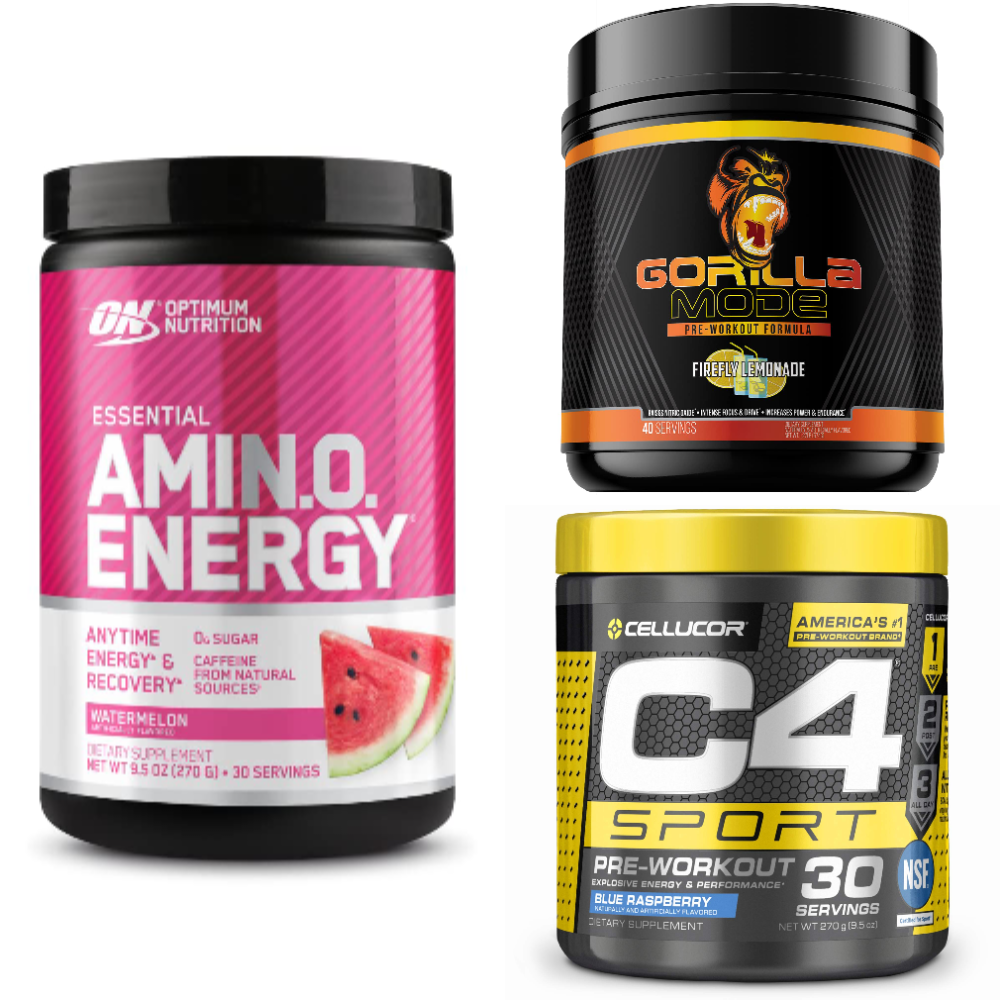We know that when it comes to pre-workout, one of the most important questions is How Much Caffeine in Pre-Workout? That's why we've put together this blog to help you understand the different types of pre-workout supplements and how much caffeine they contain. We'll also provide tips on how to choose the right pre-workout supplement for your needs. So, if you're looking for information on pre-workout supplements and how much caffeine they contain, you've come to the right place!
Understanding Pre-Workout Supplements
Pre-workout supplements are designed to boost performance, energy, and focus during exercise. They often contain a blend of ingredients, including amino acids, beta-alanine, and caffeine. The latter is particularly interesting because it's a natural stimulant that many gymgoers rely on for that extra push during training sessions.
So, how much caffeine can you expect in your pre-workout supplement?
On average, a pre-workout supplement contains between 150 to 300 milligrams (mg) of caffeine per serving. This equates to roughly one to three cups of coffee. Yes, that's right! You could be consuming as much caffeine as in your morning cup of coffee with each scoop of your pre-workout powder.
The Role of Caffeine in Pre-Workout
Caffeine is one of the most common ingredients found in pre-workout supplements, and for good reason. It has been shown to enhance various aspects of exercise performance.
For instance, caffeine may help improve muscular endurance and high-intensity exercise performance. It's also been associated with benefits in endurance sports, where it can delay fatigue and increase power output.
That said, the dose of caffeine and its impact on athletic performance can vary based on body weight and individual tolerance levels. According to the International Society of Sports Nutrition position stand the optimal dose of caffeine for exercise performance improvement is 3-6mg per kg of body weight.
Side Effects of Too Much Caffeine
While caffeine intake can offer performance benefits, it's important to remember that too much caffeine can lead to adverse reactions. These may include jitters, insomnia, headaches, and digestive issues.
To keep your caffeine consumption in check, consider the following guidelines:
1. Healthy adults should limit their daily caffeine intake to no more than 400mg of caffeine. This is roughly the amount in four cups of coffee or two servings of most pre-workout supplements.
2. If you're also consuming other sources of caffeine (like energy drinks, soft drinks, green tea, or coffee), be sure to factor these into your total daily intake.
The Benefits and Risks of Caffeine in Pre-Workout Supplements

When it comes to pre-workout supplements, caffeine is often one of the main ingredients. Caffeine is a stimulant that can help to increase energy levels and alertness, making it a popular choice for those looking to get the most out of their workouts. But how much caffeine is in pre-workout supplements, and what are the potential risks?
The amount of caffeine in pre-workout supplements can vary greatly, depending on the brand and type of supplement. Generally speaking, most pre-workout supplements contain between 50 and 200 milligrams of caffeine per serving. This is roughly equivalent to one to two cups of coffee. It is important to read the label of any pre-workout supplement to determine the exact amount of caffeine it contains.
While caffeine can provide a boost of energy and alertness, it is important to be aware of the potential risks associated with consuming too much. Caffeine can cause jitteriness, anxiety, and insomnia, so it is important to be mindful of how much caffeine you are consuming. Additionally, it is important to note that caffeine can be addictive, so it is important to be mindful of your intake and not rely too heavily on pre-workout supplements for energy.
Tips for Maximizing the Benefits of Caffeine in Pre-Workout Supplements

If you're looking to maximize the benefits of caffeine in pre-workout supplements, there are a few key things to keep in mind. First, it's important to understand how much caffeine is in your pre-workout supplement. Generally, the recommended amount of caffeine for pre-workout supplements is between 150-200mg. Too much caffeine can lead to jitters, headaches, and other unpleasant side effects.
It's also important to consider the timing of your pre-workout supplement. Taking it too close to bedtime can interfere with your sleep, so it's best to take it at least four hours before you plan to go to bed. Additionally, it's important to make sure you're drinking plenty of water throughout the day to stay hydrated and help your body absorb the caffeine.
Lastly, it is crucial to be mindful of your body's reaction to the caffeine present in your pre-workout supplement. Everyone's body is different, so it's important to listen to your body and adjust your dosage accordingly. If you find that you're feeling jittery or anxious after taking your pre-workout supplement, it may be a sign that you need to reduce your dosage.
By following these tips, you can maximize the benefits of caffeine in pre-workout supplements and ensure that you're getting the most out of your workout.
Alternatives to Caffeine-Based Pre Workouts
If you prefer a pre-workout without caffeine, there are options available. Many pre-workout products on the market today offer caffeine-free versions. These typically contain ingredients like beta-alanine, amino acids, and other ergogenic aids that can boost performance without the need for caffeine.


What is the average caffeine content in pre-workout-consumed supplements?
Most pre-workout supplements contain between 150 to 300 milligrams of caffeine per serving. This is equivalent to about one to three cups of coffee. However, the exact amount consuming caffeine consumed can vary depending on the brand and specific product, so it's always a good idea to check the label for precise information.
How does caffeine enhance workout performance?
Caffeine is a natural stimulant that has been shown to improve various aspects of exercise performance. It can enhance muscular endurance, increase power output, and delay fatigue, particularly in high-intensity workouts and endurance sports. However, the effects can vary based on individual tolerance levels and body weight.
What is the recommended dose of caffeine for improving exercise performance?
According to the International Society of Sports Nutrition, the optimal dose of caffeine for enhancing exercise performance is approximately 3-6mg per kg of body weight. However, personal needs and tolerance levels should always be taken into consideration. Consulting with a healthcare professional is recommended before adjusting your caffeine intake.
What are the side effects of consuming too much caffeine?
Excessive caffeine consumption can lead to a range of adverse reactions such as jitters, insomnia, headaches, and digestive issues. It's recommended that healthy adults limit their daily caffeine intake to no more than 400mg, which is roughly the amount found in four cups of coffee or two servings of most pre-workout supplements.
Are there caffeine-free alternatives to pre-workout supplements?
Yes, there are caffeine-free alternatives available for those who prefer a pre-workout supplement without this stimulant. These typically include ingredients like beta-alanine, amino acids, and other ergogenic aids that can boost performance without the need for caffeine. Always check the label to ensure a product meets your specific needs and preferences.
What is the best time to take pre-workout supplements?
Most pre-workout supplements should be taken 20-30 minutes before your workout. This allows enough time for the ingredients to be absorbed and start working. However, individual responses can vary, so it may take some experimentation to find the timing that works best for you.
Can you build a tolerance to caffeine in pre-workout supplements?
Yes, regular consumption of caffeine and exercise performance can lead to tolerance, meaning you might need higher doses to achieve the same effects. This is why some fitness experts recommend cycling off caffeine every few weeks to help reset your sensitivity.
Are there any medical conditions that can make taking pre-workout supplements unsafe?
People with certain medical conditions, such as heart disease, hypertension, or anxiety disorders, should be cautious about using pre-workout supplements, especially those containing high amounts of caffeine. Always consult with a healthcare professional before starting any new supplement regimen.
Can pre-workout supplements be used for weight loss?
While pre-workout supplements are primarily designed to enhance athletic performance, some ingredients, like caffeine, can potentially aid in weight loss by boosting metabolism and promoting fat oxidation. However, these effects are likely to be modest and should not replace a balanced diet and regular exercise.

Pre-workout supplements can be a valuable tool for enhancing exercise performance, especially for high-intensity workouts and endurance sports. However, it's crucial to understand how much caffeine is in your pre-workout and monitor your overall caffeine consumption to avoid side effects Always remember to consult with a healthcare professional before adding any dietary supplements to your routine, and ensure your caffeine intake aligns with your personal needs and tolerance levels.
In the end, achieving optimal performance isn't just about how much caffeine you consume. It's about a balanced diet, sufficient sleep, and consistent training. So, power up, stay safe, and crush those fitness goals!












